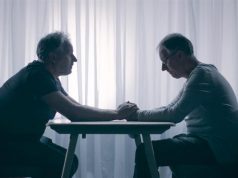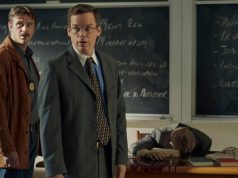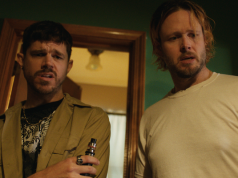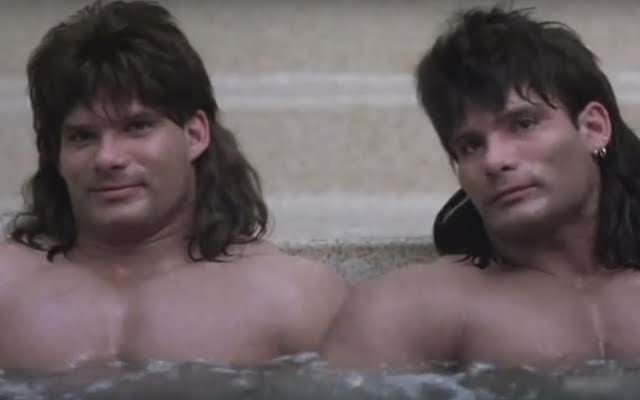
One of several grudges we have against Arnold Schwarzenegger is that his success in Hollywood made a lot of bodybuilders think that they, too, could be movie stars without being able to act or pronounce English words. Among these starry-eyed hopefuls were Peter and David Paul, aka the Barbarian Brothers, identical twins from Connecticut who trundled into Hollywood with their heads full of dreams and their veins full of protein shakes, their magnificent brunet mullets billowing in the breeze behind them. They were destined for greatness.
Or so it seemed! Though the hulking twins starred in a handful of movies, none of them were successful — not artistically, critically, financially, or strategically. Some were not even successful at being films, except in the loosest technical sense. The Pauls never became A-list celebrities or pop-cultural icons.
And of course that was fair, because the Pauls were terrible at acting, even by the very low standards set by other athletes*-turned-actors. They mumbled their lines as if they’d only learned to speak that afternoon. They essentially always played themselves, and they were bad at that. They didn’t deserve to be famous. Hollywood isn’t always a meritocracy, but sometimes it works out that way.
Our text this week is “Double Trouble,” a 1992 caper whose title suggests that Peter and David were already, at this early stage in their careers, not giving a crap what their movies were called. “Double Trouble”? Come on. I bet that was the title of every fifth “Patty Duke Show” episode. Peter and David play twins named Peter and David, which does nothing to discourage the stereotype of bodybuilders being dumb. (Also not helping: these two are dumb.) David is a police detective; Peter is a cat burglar. After not having seen each other in years, the brothers are reunited when David arrives at the scene of a break-in and attempts to arrest Peter, at whom he fires several bullets, missing every shot, before Peter escapes by leaping off the roof of the skyscraper they’re on.
Does Peter have super powers? He does not. His jump from the rooftop is set up in a way that makes us expect a cut to another angle, where we’d see that there’s a scaffold or ledge or something. We’ve seen this trick in other movies! Except this movie forgot to include those shots. Going only by the information the film has provided, we’re left to conclude that Peter can plummet from skyscrapers without suffering injury.
I mention this detail because it’s representative of the movie as a whole, i.e., it was made by people who lacked even a rudimentary knowledge of how to make a movie. It would not surprise me to learn that scenes are missing because there was no film in the camera when they shot them, or because the director accidentally taped over them.
But back to the story. David’s fellow cops ridicule him, as well they should, for letting the cat burglar get away, while his partner, a lady named Danitra (A.J. Johnson), goes to a meeting with an informant. Danitra, by the way, is always dressed like a hooker — presumably for undercover purposes, though it’s never mentioned. (“Shoot, what was on this tape? Was it the scene where we explain why Danitra is dressed like a hooker??”) She gets killed at her meeting, which we knew was going to happen because the movie is about David and his twin brother, not David and his possibly-a-hooker partner.
Danitra’s murder is somehow connected to another murder that we saw earlier, that of a stern gray man in a suit who had a briefcase handcuffed to his wrist. The briefcase didn’t contain anything interesting like cash or Marsellus Wallace’s soul, it was just a key card, which the bad guys need to perpetrate a jewel heist, which is somehow connected to money-laundering, which is somehow connected to local
businessmen and city councilors, which is somehow connected to Danitra’s murder. And how are all these things connected? Well, they all occur in the same movie. That’s as far as I was able to narrow it down.
The doubleness of the trouble alluded to by the film’s title comes into play when Peter does another burglary and gets arrested, seemingly on purpose, though the movie is as unclear on this point as it is on everything else. Peter claims to have information about the money-laundering thing — which you’ll recall is somehow connected to the murders — and in exchange for immunity on the burglaries he offers to help David solve the case. That’s right: David’s felonious twin brother is now his law-enforcement partner! You can imagine the funny things this implausible scenario might lead to. You’ll have to imagine them, in fact, because the movie doesn’t show any. What the movie does show is a lot of dumb sibling rivalry gags and hijinks where the guys work together to do something idiotic to a suspect, like turn his car upside-down.
Because they’re very strong, you see. The movie takes great pains to keep reminding us of that.
At one point they have a knock-down, drag-out fistfight that sends them sprawling into the street, and then they make up and
forget about it, as brothers do. That part is logical. Later David gets punched one time in the face by a scrawny criminal, and it knocks him out. This sounds illogical but is actually in accordance with the Hollywood law of action movies that allows brawny heroes to be rendered unconscious by a single punch if the plot requires it.
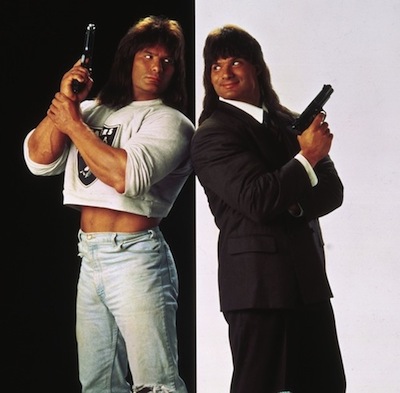
Let’s pause for a moment to discuss the twins’ physical appearance. They are identical as far as I can tell, each brother’s grotesquely misshapen arms and cartoonishly oversized thighs matching the other’s. Their thick, luxurious mullets are a perfect set, like two expertly crafted comedy wigs made from otters. But they dress differently. Peter, the criminal, always wears a slick suit that is somehow too large for him; he looks like a Mafioso on court day. David, the cop, wears tight acid-wash jeans that come up way past his waist, and a Raiders sweatshirt that only comes down to mid-belly, as if he’s some kind of prehistoric monster that’s never had to wear human clothes before.
Is there a scene where one of them does some bodybuilding? There is. It’s David. Frustrated after a hard day at work, he goes home and does bench presses while grunting sexually. This tender moment is accompanied by the sort of music you normally hear during sex scenes. Conclusion: lifting weights is how David has sex. You’re welcome!
Incidentally, the following famous people have supporting roles in this movie: David Carradine, Roddy McDowall, James Doohan, and Troy Donahue. They all belong to the class of actors where at first you think, “What?? What is someone of that caliber doing here??,” but then you think about it a little bit more and realize that no, this is about right. I mean, David Carradine was in something like 200 movies, but how many of them were substantially better than “Double Trouble”? Ten or eleven?
“Double Trouble” has the stink of a movie meant for children, with simple jokes and broad characters and a barely coherent storyline. Yet it’s rated R and has dirty jokes, swearing, and bullet wounds. (A lot of people get killed in this movie.) Who was the intended audience, then? The mentally infirm? People just coming out from under anesthesia? Bodybuilder groupies?
I don’t know where the Paul twins are now, or care. But I like to think they fly into fits of rage every time they see an actor playing his own twin in a movie, like Nicolas Cage in “Adaptation” or Adam Sandler in “Jack and Jill.” “Those roles should be going to actual twins!!” is what I like to believe Peter and David shout at the movie screen, in unison, before being asked to leave by theater management.
*For the purposes of this sentence alone, we are extending the definition of “athlete” to include professional bodybuilders.
— Film.com


